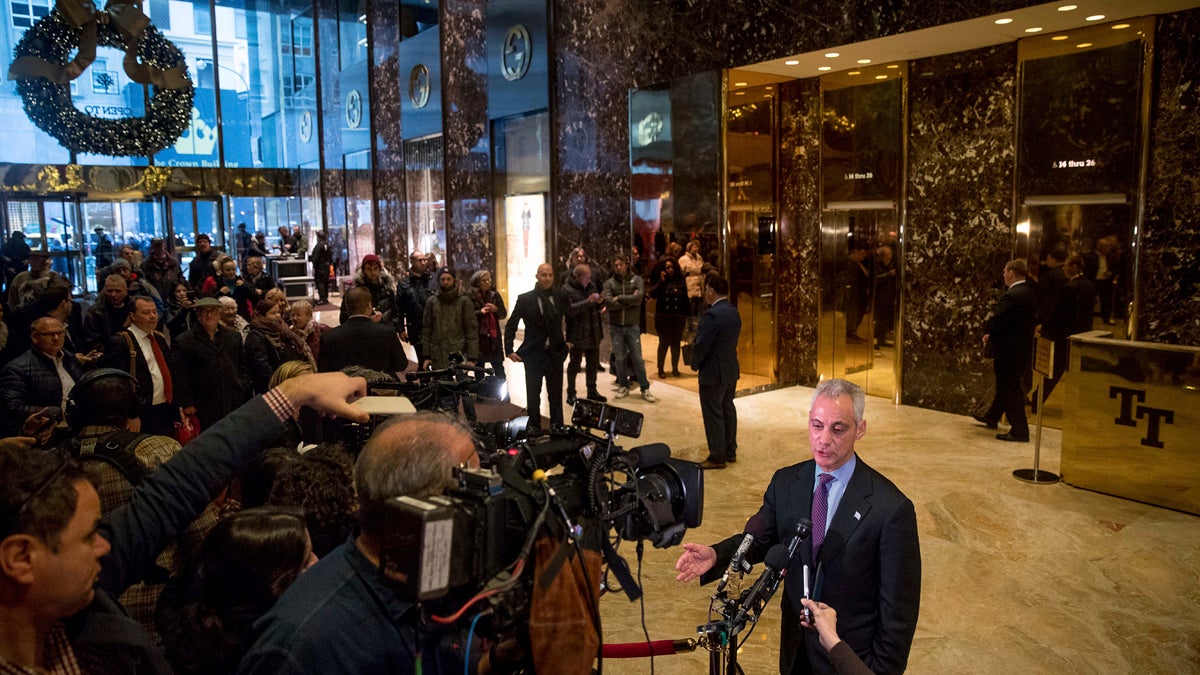Cities prepare for President Trump

Chicago Mayor Rahm Emanuel speaks with members of the media after meeting with President-elect Donald Trump at Trump Tower in New York
The new administration may have different priorities than the leaders of major U.S. cities.
The last eight years were pretty good for the relationship between Washington, D.C. and Pennsylvania’s major cities. President Obama made visits to Philadelphia and Pittsburgh, and the Democratic leadership in both cities worked closely with his administration. Sure, there’s always room for more funding and more cooperation, but their progressive policies met little resistance from the Commander in Chief.
Now, there’s a new sheriff in town, and his name is Donald Trump. Trump won the presidency by appealing to voters outside the big cities, speaking to rural resentment in communities that felt disenfranchised by, among other things, big city politics. If he upholds many of the promises he made on that campaign trail, Trump will likely find himself at odds with the Democrats leading most major U.S. cities.
Both Philadelphia Mayor Jim Kenney and Pittsburgh Mayor Bill Peduto have already expressed concerns about what a Trump presidency might mean for their cities, and they’re not alone.
DACA and Dreamers
One point of contention for major U.S. cities is immigration. Cities have been on the forefront of progressive immigration policies, from declaring themselves sanctuary cities to supporting students under the Deferred Action for Childhood Arrivals (DACA) program. Trump has promised to roll back that program and cut off federal funding for sanctuary cities.
On Wednesday, Chicago Mayor Rahm Emanuel met with Trump and delivered a letter co-signed by the mayors of 14 cities, including Philadelphia. The letter asked Trump to reconsider his stance and allow DACA students to continue to live in the United States.
Speaking at the Brookings Institution in Washington, D.C. on Friday, Emanuel said DACA is “in our self-interest. [These students] speak to the values of who we are and regardless of where the national government goes, we’re going to be clear about what we can do.”
That being said, Emanuel continued, “There are limitations to how far you can take this, where, if the federal government decides to work against you, you can’t really, on your own, fight the current.”
That current can include federal funding, which cities rely on heavily and which can be used as a tool to encourage cooperation with the federal government. That’s one tool that both Trump and Republican Senators like Pennsylvania’s Pat Toomey have threatened to use to reign in sanctuary cities.
Finding room for cooperation
Before he left to be mayor of Chicago, Emanuel served as Obama’s Chief of Staff for the first two years of his presidency. So he knows how Washington, D.C. works, and he’s hoping that there will be room for cities and the feds to find common ground.
One area of mutual agreement could be infrastructure repair. Trump has promised to rebuild America’s roads, bridges and transportation networks. According to his website, that plan involves providing “maximum flexibility to the states.”
Though Emanuel would like to see that flexibility given to cities as well, he agrees with Trump, saying “investing in infrastructure [and] transportation is a fundamental, not only job creator today, but economic engine going forward.”
He’d also like to see cities work with the federal government to develop higher education opportunities and build up grassroots projects that could use a funding boost.
“I’d like to have a federal government that understood what it means to be a partner in achieving these goals,” said Emanuel. “Absent that, it makes … economic, cultural and intellectual engines, their role in the economy, harder not easier.”
WHYY is your source for fact-based, in-depth journalism and information. As a nonprofit organization, we rely on financial support from readers like you. Please give today.


